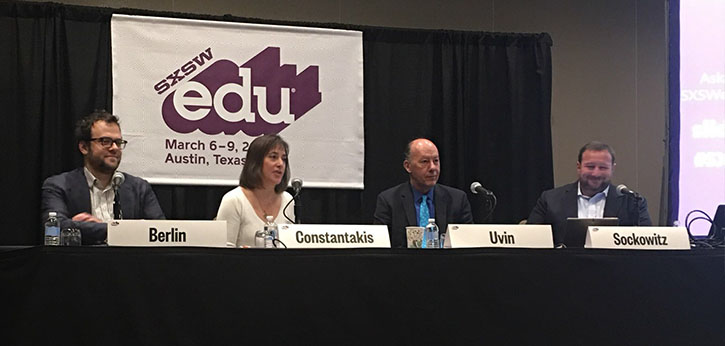IEL’s new president, Johan Uvin, was invited to speak at an SXSW panel on reaching and engaging adult learners with mobile technology. Read his reflections.
SXSWedu fosters innovation in learning by hosting a diverse and energetic community of stakeholders across a variety of backgrounds in education.
I had never been to SXSWedu and was delighted to have the opportunity to participate this year and represent IEL. I was part of a panel called Reach and Engage More Adult Learners with Mobile Tech. The panel addressed the issue that over 36 million—1 in 6—adult Americans lack the basic skills they need to access postsecondary education or better employment opportunities, yet adult education programs serve less than four million people annually (with publicly funded programs serving just under 1.5 million adults every year).
The panel brought together diverse expertise from government, academia, and industry to envision revolutionary ways for mobile technologies to cost-effectively increase access to, persistence in, progress through, and completion of adult education and workplace programs. Our conversation was moderated by Ira Sockowitz, CEO of Learning Games Studios.
Mike Berlin from Entangled Solutions shared findings from recent research (Accelerating Change: A Guide to the Adult Learning Ed-Tech Market) and provided the investor’s perspective. Patti Constantakis, the Director of Adult Education Initiative at Digital Promise, examined current practice. Drawing on my prior government experience, I added insights regarding the role of the public sector in creating access via mobile technologies. I introduced the notion of supporting an adult learning infrastructure that is based on mobile devices in people’s “purses and pockets.” I also pointed at the enormous opportunity artificial intelligence and virtual reality based applications hold from an equity perspective. A good role for the public sector, I suggested, was to stimulate developers to create adult learning technology solutions.
We discussed current methodologies and critical issues in the delivery of adult education today and explored reasons behind the current underutilization of technology in adult education. We concluded that mobile technologies do increase engagement and lead to greater retention. We acknowledged that – unlike in K-12 and postsecondary education – very few companies are currently delivering evidence-based content. We noted the significant professional development needs that should be addressed if we want to truly integrate mobile technology into a program. The biggest challenge we all saw was the underdevelopment of the mobile technologies market for low-skilled adults. While this is a significant new market, very few companies have moved into it and our shared challenge is to find ways to stimulate industry development (see Digital Promise example).
I attended several sessions. Two were of particular interest. One was a keynote session where Tim Ferriss and Charles Best explored Ferriss’s insights in and “his secrets of accelerated learning and mastery.” Ferris introduced his framework for deeper and accelerated learning consisting of: deconstruction (break learning down into its component parts), selection (decide what to focus on), sequencing (determine the sequencing), and stakes (incentives and rewards). The second one was a Policy Forum titled Equity for All Children: 4 Funders, 4 Approaches where Carla Thompson Payton (WK Kellogg Foundation – Vice President for Program Strategy), Hilary Pennington (The Ford Foundation – Vice President Education/Creativity/& Free Expression), Kyle Peterson (Walton Family Foundation – Executive Director), and Sara Allan (Bill & Melinda Gates Foundation – Deputy Director Market Acceleration) shared their equity investment priorities and strategies going forward. The generational (long-term) investment in communities Carla spoke about struck me as important and right. Other funders, too, placed a great emphasis on place-based, community-based investments and acknowledged the need to support organizational capacity building and general support.
One of my main takeaways was that the place-based strategies underlying IEL’s work align well with the policy and investment priorities of key funders in the equity space.
